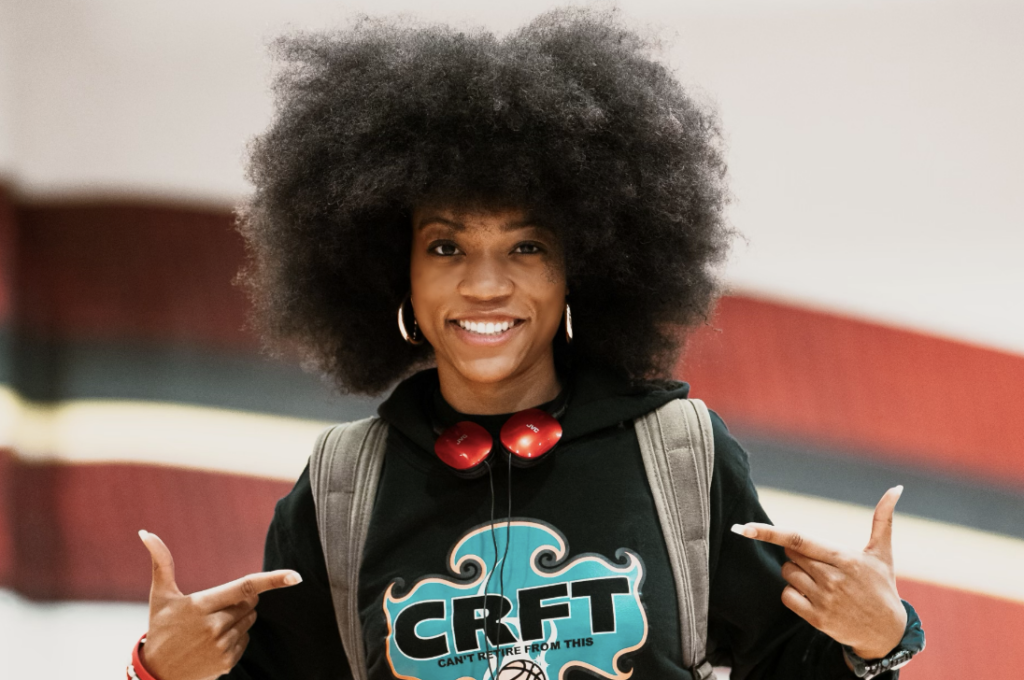Basketball had betrayed Melanie Page, and so Page moved on: She graduated college, moved to California and embarked on a career in film.
Then, in the spring of 2020, when the pandemic brought the world to a halt, Page came home to Laurel, Md., and volunteered as an assistant coach with her mother’s AAU team. That’s when it hit her: She was not ready to say goodbye.
Page had been a star player at Elizabeth Seton High School (Bladensburg, Md.), only to have her college dreams cut short when she suffered a concussion during a game in front of recruiters. She told everyone who would listen that she was done with the game forever. But as she worked with her mother’s players, a group of 16-year-old girls who’d gone wild when they learned she’d won a Washington Catholic Athletic Conference title as a player, Page realized the impact basketball had on her life — and the lives of players throughout the District of Columbia, Maryland, Virginia (DMV) area.
The filmmaker hopes to capture that essence in “Can’t Retire From This,” an upcoming four-part documentary series highlighting women’s basketball in the DMV, and the role the game plays in uplifting local youth. The project is now in post-production, and Page is searching for a distribution home.
“Being re-accepted in this community and finding my lane in the sport that I loved so much and immersed myself in so much, it’s like becoming a child again,” Page said. “And rewriting the story.”
The 2020 Showtime documentary “Basketball County: In the Water,” produced by Kevin Durant’s Thirty Five Ventures (disclaimer: Thirty Five Ventures is an investor in Just Women’s Sports), shone a spotlight on the history of youth basketball in Maryland’s Prince George’s County.
That film mostly focused on the boys’ game, though, and Page saw an opportunity for a project focused on girls and women in the area. Her first interview for the project was with Hank Lloyd, a former assistant at local independent power Riverdale Baptist under Diane Richardson, now the head coach at Temple, on June 1, 2020.
Lisa Bodine, a longtime DMV coach and talent evaluator who now runs the non-profit Godmother Sports Foundation, was also among the early interviewees.
“It’s a story that needs to be told,” Bodine said. “(In the 2000s) you could look down an ACC roster and every team would have a DMV player on their roster.”
Page at one point thought she might be the next in line. Her love for the game began in the late 1990s when the Washington Mystics, one of the WNBA’s first expansion franchises, showed Page women who looked like her could be basketball stars. She caught on as a ball girl for the Maryland women’s basketball team, with her final season coming in 2006 when the Terps won the national championship.
She made her own name as a player in the DMV, brushing elbows with a lot of the women she would later interview for the documentary, including Kenia Cole.
Cole grew up in Silver Spring, Md., about 30 minutes from Page in Laurel, and played with and against Page when they were kids. She then played college ball at Hampton, an HBCU in the southwest corner of Virginia not considered to be part of the DMV (the area cuts off in Northern Virginia), where she now works as an assistant coach. When Page, who founded her Major Motives production company as a North Carolina A&T freshman (she graduated in 2015), approached Cole about sharing her story in the documentary, Cole was hesitant.
“I didn’t think anyone would want to hear my story,” Cole said. “Most of the time, when young girls hear about women’s basketball, they want to hear about the professionals. … I didn’t do that. I also didn’t get a lot of offers. I worked for everything I got through basketball.”
Part of what Page wants to highlight in the documentary is the off-court opportunities basketball can provide, especially for those who don’t make it to the top level. The DMV regularly ranks among the top areas in the country for sending players to Division I schools, Page said.
“Knowing myself as a Black woman, and seeing how many educated Black women have come from the area because of basketball, is astounding,” Page said.
The project will examine some of the bigger names to come out of the area, too, like Penny Toler, the D.C. native who scored the first basket in WNBA history for the Los Angeles Sparks and later led the franchise to the 2001 WNBA championship as general manger. Page also took a particular interest in Rebekkah Brunson, the former Minnesota Lynx forward who’s won the most WNBA championships (five) of any player.
Brunson, now an assistant coach for the Lynx, was born in Washington, D.C. and attended Oxon Hill High School (Md.), a public school. As Page dug deeper into the local basketball scene, she learned about the disparity in resources facing players at public and private schools.
At Elizabeth Seton, Page had no problem building relationships with college coaches. But Brunson had to rely on her hard work.
“She did what she had to do to become what she’s become,” Page said. “I want girls, going back to my mom’s basketball team, (to know) if they don’t go to private schools in the area, they can still become successful in the sport and because of the sport.”
Page, Cole and so many others are examples of the latter point.
Cole often commutes three-plus hours from Hampton, a university in the southwest corner of Virginia, to recruit in the DMV area. When she meets with prospects, she sees younger versions of herself and Page, girls who love the game and are eager to excel as adults.
They have the same dreams as the players on Page’s mother’s AAU team, who inspired a lapsed basketball lover to dive back into the game. Fifty-eight interviews later, Page feels like she’s wound back the clock.
“Every person I’m talking to,” Page said, “I feel like I’m 10 years old again.”
Josh Needelman is the High School Sports Editor at Just Women’s Sports. Follow him on Twitter @JoshNeedelman.

